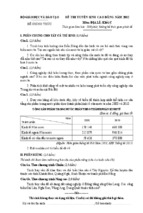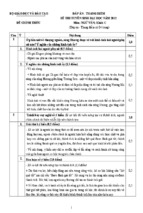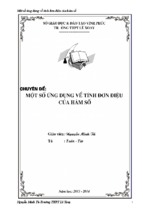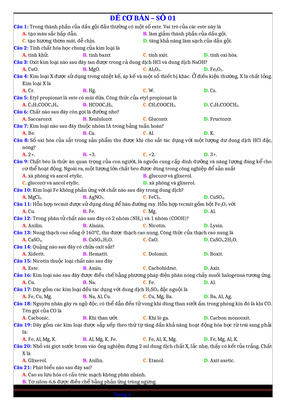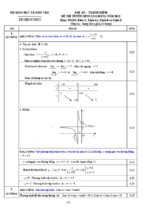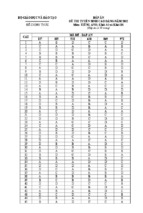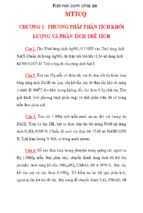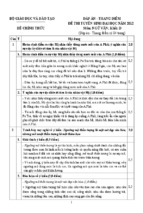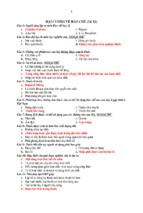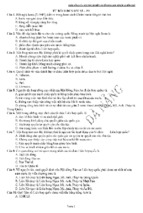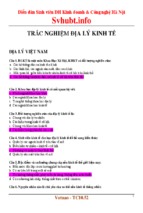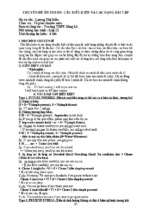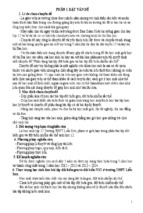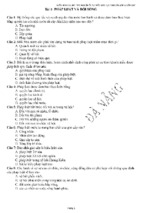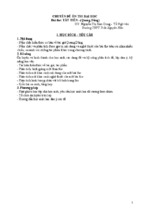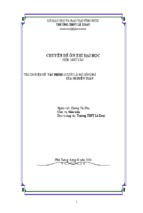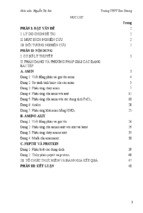CHUYÊN ĐỀ: CÂU BỊ ĐỘNG
Giáo viên: Lê Thị Thúy Hằng
Đơn vị: Trường THPT Tam Dương II.
Môn: Tiếng Anh
MỤC LỤC
PHẦN 1: ĐẶT VẤN ĐỀ
1. Cơ sở lý luận:
2. Cơ sở thực tiễn:
PHẦN 2: NỘI DUNG
A. Hệ thống kiến thức:
I. Kiến thức cơ sở:
1.Active voice – passive voice (Thể chủ động – thể bị động)
2.Passive form (Dạng bị động):
3.Change an active sentence into a passive sentence (Đổi câu chủ động sang câu bị
4.Things learned before changing an active sentence into a passive sentence
(Những điều cần nắm trước khi chuyển từ câu chủ động sang câu bị động).
5.Scope of change an active sentence into a passive sentence (Phạm vi chuyển đổi
từ câu chủ động sang câu bị động)
6.Active or passive ? (Chủ động hay bị động ?)
II. Tenses in the passive (Bị động với các thì):
III.Modal verbs in the passive (Bị động với động từ khuyết thiếu).
IV. The passive with verbs of reporting (Bị động với động từ tường thuật).
V. The passive to – infinitive and gerund (Bị động với động từ nguyên thể và danh
động từ)
VI. Patterns with “have” and “get” (Cấu trúc dùng “have” và “get”).
VII. The passive with the verbs of giving (bị động với những động từ cho, tặng)
VIII. The passive with “make” (Bị động với động từ “make”)
B. Bài tập ứng dụng:
I. Bài tập
II. Đáp án
PHẦN 3 : KẾT LUẬN
PHẦN 4 : TÀI LIỆU THAM KHẢO
1
PHẦN 1: ĐẶT VẤN ĐỀ
3. Cơ sở lý luận:
Tiếng Anh là ngôn ngữ thông dụng toàn cầu và cũng là môn học đã và đang được đi
đầu trong việc đổi mới tại các trường trung học phổ thông. Bộ GD-ĐT đã xây dựng
phương án nhằm nâng cao chất lượng dạy và học ngoại ngữ trên cả nước. Có thể nói
Tiếng Anh nói riêng và ngoại ngữ nói chung đang là tiêu điểm được quan tâm và phát
triển mạnh mẽ. Đổi mới và nâng cao chất lượng học ngoại ngữ cần nhiều giải pháp đồng
bộ mà trước hết phải đổi mới phương pháp dạy và học.
Tuy nhiên để cho học sinh nâng cao năng lực Tiếng Anh thì ngoài việc cung cấp
cho các em một vốn từ vựng dồi dào, giáo viên cũng cần phải xây dựng cơ sở ngữ pháp
chắc chắn. Và từ đó giúp các em phát huy khả năng ứng dụng trong hoạt động giao tiếp
bằng Tiếng Anh.
Về ngữ pháp Tiếng Anh, thông thường học sinh cho rằng nó rất bí hiểm, khó hiểu,
do vậy mà các em cảm thấy nặng nề, nhạt nhẽo và trở nên chùn bước, e ngại. Chính vì thế
việc dạy kiến thức theo từng chuyên đề một cách có hệ thống, logic, dễ hiểu là điều hết
sức cần thiết.
4. Cơ sở thực tiễn:
Chúng ta không thể phủ định một điều rằng thể bị động trong Tiếng Anh là một trong
những phần ngữ pháp rất quan trọng. Nó được sử dụng phổ biến không những trong văn
viết mà còn trong những giao tiếp hàng ngày. Tuy nhiên kiến thức về thể bị động lại được
cung cấp một cách rải rác trong sách giáo khoa từ Tiếng Anh 10 đến 12, điều này khiến
các em học sinh dễ quên và nhầm lẫn. Thậm chí một số học sinh còn chẳng hiểu tại sao
phải sử dụng câu bị động trong khi chúng ta đã có câu chủ động.
Từ thực tế đó, tôi đã đưa nội dung “Thể bị động trong Tiếng Anh” vào giảng dạy cho
đối tượng học sinh lớp 12 với thời lượng là 12 tiết để giúp các em có khả năng ứng dụng
thể bị động ở nhiều tình huống khác nhau.
2
PHẦN 2: NỘI DUNG
A. Hệ thống kiến thức:
I. Kiến thức cơ sở:
So sánh câu chủ động và câu bị động :
a. Active :
OBJECT
They built
-> Passive :
be V (p.p)
Mary cleans the flat everyday.
S
-> Passive :
( simple past)
was built in 2010.
this house
This
house
SUBJECT
b. Active:
in 2010.
this house
V
O
(simple present)
Adverb of time
The flat is cleaned everyday by Mary.
S
be
V(p.p)
Adv
by
O
1.Active voice – passive voice (Thể chủ động – thể bị động)
- Câu chủ động : Chủ nghữ của động từ là người hay vật thực hiện hành động
- Câu bị động : Chủ ngữ là người hay vật nhận hành động do người khác thực hiện.
Be + V(past participle)
2.Passive form (Dạng bị động):
3.Change an active sentence into a passive sentence (Đổi câu chủ động sang câu bị
động).
- Sơ đồ :
Câu chủ động:
S
Câu bị động :
S
O
+
+
be
V
+
O
+ V (P.P) + ….+ by + O
- Các bước chuyển đổi :
Bước 1 : Lấy tân ngữ của câu chủ động làm chủ ngữ của câu bị động.
Bước 2 : Viết động từ “Be” ở cùng thì của động từ của câu chủ động.
Bước 3 : Lấy quá khứ phân từ (past patticiple- pII) của động từ câu chủ động.
Bước 4 : Viết bổ từ (chỉ thời gian, nơi chốn..) nếu có, sau quá khứ phân từ.
Bước 5 : Lấy chủ nghữ của câu chủ động làm tân ngữ của câu bị động, viết sau
giới từ “by”.
4.Things learned before changing an active sentence into a passive sentence (Những
điều cần nắm trước khi chuyển từ câu chủ động sang câu bị động).
a. Xác định 3 thành phần chính của câu : S, V, O
b. Câu chủ động ở thời nào thì câu bị động ở thời đó, ở dạng câu nào thì bị động
cũng ở dạng câu đó (Khẳng định, phủ định, nghi vấn).
3
E.g. + They haven’t used this foom for a long time (Present perfect, negative )
-> This foom hasn’t been used for a long time
+ Did workers repair the bridge ? (simple past, interrogative)
-> Was the bridge repaired (by) (workers) ?
c. Nếu chủ ngữ của câu chủ động là đại từ nhân xưng (personal pronouns):
I/we/you/he/she/it/they hoặc là đại từ phiếm định (indefitive pronouns): someone,
everyone, ...hay là từ “people” thì ta bỏ tân ngữ của câu bị động (túc từ tác nhân)
Eg . Someone stole my wallet
-> My wallet was stolen
5.Scope of change an active sentence into a passive sentence (Phạm vi chuyển đổi từ
câu chủ động sang câu bị động)
Câu nào dưới đây có thể chuyển sang bị động :
He arrived at 6 p.m
S
Vi
(can’t change)
Adv of time
- These windows need painting
S
V
Ving(G)
- They have a nice house
S
V
(can’t change)
Adv
- Tom kicked the ball
S
(can’t change)
Predicate
- He runs very fast
S V
(can’t change)
V
(can change)
O
-> The ball was kicked by Tom
Không phải tất cả động từ đều có thể có dạng bị động. Về nguyên tắc chung có ba loại câu
không chuyển sang được thể bị động, đó là :
- Câu có nội động từ (Intransitive verb) vì nội động từ không có tân ngữ :
die, arrive, lie, came, ....
- Những câu chủ động nhưng mang nghĩa bị động.
E.g + The machine isn’t safe to use
+ The chairs need cleaning
- Những câu có động từ chỉ trạng thái (state verb) hoặc động từ liên hệ như : have,
be, belong; exist, seem, look, become.... Như vậy chỉ có những câu chủ động chứa ngoại
động từ (transitive verbs) mới có thể chuyển được sang câu bị động.
6.Active or passive ? (Chủ động hay bị động ?)
6.1.Chúng ta lựa chọn sử dụng dạng bị động khí chúng ta muốn nói về hành động
mà không quan tâm ai là người làm việc đó.
- The report was typed (by the secretary).
- Those pyramids were built around 400AD.
- A lot of money is given to help the hungry.
4
6.2 Việc lựa chọn sử dụng chủ động hay bị động còn phụ thuộc vào chủ đề được
nói đến.
Hãy nghiên cứu 2 đoạn văn dưới đây. Một đoạn văn nói về nhà khoa học J.J. Thomson và
đoạn kia nói về “electron”.
THOMSON, SIR JOSEPH JOHN
ELECTRON
(1846 – 1940)
British physicist and mathematician and
head of a group of researchers at the
Cavendish Laboratory in Cambridge.
Thomson discovered the electron. He
is regarded as the founder of modern
physics.
A subatomic particle and one of the basic
constituents of matter. The electron was
discovered by. J.J. Thomson. It is found in
all atoms and contains the smallest known
negative electrical charge.
So sánh hai câu từ 2 đoạn văn :
- Thomson discuered the electron
- The electron was discovered byThomson
Hai câu có cùng nghĩa nhưng có chủ đề khác nhau. Chủ đề của câu 1 là Thomson
và chủ đề của câu 2 là “ Electron”. Chủ đề là khởi đầu của câu và thường là chủ ngữ.
6.3 Bị động không có tân ngữ được sử dụng phổ biến ở trong văn viết và trong khoa
học. Cụ thể:
- Tác nhân gây ra hành động không liên quan đến nội dung :
E.g + A large number of Sherlock Holmers films have been made.
+ The atom was regarded as solid until the electrom was discovered in 1897.
- Khi chúng ta không biết hoặc không biết chính xác hoặc đã quên người đã thực hiện
hành động đó :
E.g : - My car was stolen
- The window was broken
- Khi chúng ta không muốn đề cập đến tác nhân gây ra hành động :
E.g : Mistakes have been made.
II. Tenses in the passive (Bị động với các thì):
Không phải tất cả các thì đều có dạng bị động. Người Anh chỉ sử dụng bị động với các
thời sau :
1.Simple present :
Active :
S + V (s/es) + O
Passive :
S + am/is/are + V(p.p) +(By + O)
E.g : People speak English here
-> English is spoken here
2.Present progressive
Active : S + is/am/are + Ving + O
Passive : S + is/am/are + being + V(p.p) + (by + O).
5
E.g. Mr. Blake is paiting the house
-> The house is being painted by Mr.Blake
3.Presen petfect :
Active : S + have/has + V(p.p) + O
passive : S + have/has + been +V (p.p) + (by + O)
E.g People have seen elephants in the streets.
-> Elephants have been seen in the streets
4.Simple past :
Active : S + V(past) + O
Passive : S + was/were + V(p.p) + ( by + O)
E.g :The police found the drugs.
-> The drugs were found by the police.
5.Past progressive
Active : S + was/were +Ving + O
Passive : S + was/were + being + V(p.p) + (by + O)
E.g : Detectives were questioning three men last night.
-> Three men were being questioned by detectives last night.
6.Past perfect :
Active : S + had + V(p.p) + O
Passive : S + had + been + V(p.p) + (by + O)
E.g: I knew why they hadn’t chosen me.
-> I knew why I hadn’t been chosen.
7.Simple future :
Active : S + will + Vinf + O
Passive : S + will + be + V(p.p) + (by + O)
E.g: They will tell you when the time comes
-> you will be told when the time comes
8.Future perfect :
Active : S +will + have + V (p.p) + O
Passive : S + will + have been + V (p.p) + (by+ O)
E.g: you will have done everything by Tuesday.
-> Everything will have been done by Tuesday.
9.Near future (Be going to do sth):
Active : S + is/am/are +going to+Vinf + O
passive : S + is/am/are + going to be + V(p.p) + (by + O)
E.g: They are going to build a new public library
-> A new public library is going to be built
III.Modal verbs in the passive (Bị động với động từ khuyết thiếu).
6
E.g : + Tom can repair broken watches.
-> Broken watches can be
repaired.
ModalV
V (p.p)
+ The robber may kill the dog.
-> The dog may be killed by the robber.
ModalV
V(p.p)
+ They shouldn’t throw rubbish away.
Modal V
Vinf
-> Rubbish shouldn’t be thrown away.
Modal V
Form :
V (p.p)
S + modal Verb + be + V(p.p) + (by+ O)
* Modal vetbs : can, could, should, may, might, would, must, ...
IV. The passive with verbs of reporting (Bị động với động từ tường thuật).
It is said that...................
He is said.........................
a. Examples:
1.They say that
S1
V1
he
is a good doctor.
S2
V2
clause1
Clause2 (that – clause)
Method 1 :It is said that he is a good doctor.
Method 2 : He is said to be a good doctor.
S2
To – V
2.People said that he had left for London.
S1
V1
S2
V2
Clause 1
Clause 2 (That – Clause)
-> Method 1 : It was said that he had left for London.
Giữ nguyên that – clause
-> Method 2 : He was said to have left for London.
S2
To have V (p.p)
3. Mamy people believe that the army is crossing the frontier.
S1
Clause 1
V1
S2
V2
Clause 2 (that – Clause)
7
-> Method 1 : It is believed that the army is crossing the frontier.
Giữ nguyên that - clause
-> Method 2 : The army is believed to be crossing the frontier.
S2
to be
Ving
b. Đối với động từ tường thuật, ta có hai cách biến đổi sang bị động:
- Mothod 1 (cách thứ 1 );
+ Chủ ngữ luôn là “It”
+ Ghi lại mệnh đề - that
+ Đổi động từ 1 (V1) sang hình thức bị động.
-Method 2 (Cách thứ 2):
+ Lấy chủ ngữ 2 (S2) làm chủ ngữ của câu bị động.
+ Đổi động từ 1 (V1) sang hình thức bị động.
+
Nếu V2 chia ở thời hiện tại thường, tương lai thường thì sang bị động ta sử
dụng : To – V
Nếu V2 chia ở thời quá khứ thường, hiện tại hoàn thành, quá khứ hoàn
thành thì sang bị động ta sử dụng : to have + V(p.p).
Nếu V2 chia ở thời hiện tại tiếp diễn hoặc quá khứ tiếp diễn thì sang bị động
ta sử dụng : to be + Ving
c.Chúng ta có thể dùng mẫu câu này với các động từ sau :
think
believe
report
understand
say
know
expect
consider
declare
discover
allege
feel
find
see
estimate
suppose
V. The passive to – infinitive and gerund (Bị động với động từ nguyên thể và danh
động từ)
a. Examples :
-I expect to be invited to the wedding.
to be + V (p.p)
- It’s awful to be criticized in public.
to be + V (p.p)
- I’d like this rubbish to have been cleared away when Iget back.
to have been + V(p.p)
- He hates being called “pig”.
being + V(p.p)
- I’m annoyed at having
been made a fool of.
having + been V(p.p)
8
- I was afraid of being laughed at.
being + V (p.p)
b. Patterns (Cấu trúc):
1. To – infinitive : To be +V (p.p)
2. Perfect to-infinitive :To have been + V (p.p)
3. Gerund : Being +V(p.p)
4. Perfect gerund : having been +V(p.p)
VI. Patterns with “have” and “get” (Cấu trúc dùng “have” và “get”).
E.xamples :
+ Active : I had prople repair the roof.
have + o + Vinf
-> Passive : I had the roof repaired.
have + O
+ V (p.p)
+ Active : She got people to cut the grass.
get + O + to –V
-> passive : She
got the grass cut.
get +
O
+ V (p.p)
1.The active (dạng chủ động):
have + O + Vinf
get + O + to – V
Nhờ ai đó làm gì
2.The active (Dạng bị động):
have/get + O + V (p.p)
Chúng ta có thể sử dụng cấu trúc bị động của “get/have” để nói về điều gì đó đã xảy ra,
thường là những điều không vui vẻ.
E.g:
- we had a window broken in the storm.
- My sister has had some money stolen.
VII. The passive with the verbs of giving (bị động với những động từ cho, tặng)
Examples :
Active : she gave her sister the car.
S + V + Indirect O + Direct O
-> Passive : Her sister was given the car.
The car was given to her sister
- Đối với những động từ theo sau bởi 2 tân ngữ : Tân ngữ gián tiếp (Indirect object) và tân
ngữ trực tiếp (Direct object), chúng ta có 2 cách chuyển sang bị động.
9
- Chúng ta có thể dùng cấu trúc bị động này với những động từ sau :
E.g:
Send
give
buy
teach
lend
tell
show
pay
throw
- The visitors were shown a collection of old manuscripts.
- Sam’s photo had already been shown to the policewoman.
VIII. The passive with “make” (Bị động với động từ “make”)
a. Examples :
1.Active : It is your duty to wash the clothes.
passive : you are made to wash the clothes
be + made + to-V
2.Active : Tom’s father makes him get up early every morning.
make
0
Vinf
passive :Tom is made to get up early every morning.
be + made to-V
b. Pattern :
Chủ động : make + 0 + vinf ( Bắt ai làm gì
Bị động : Be made + 0 + to-V (Bị bắt làm gì ).
B. Bài tập ứng dụng:
Exercise 1: Rewrite the following sentences without changing their meaning
I.
1. People speak English in 44 countries.
-> English....................................................................................
2. They milk the cows twice a day.
-> The cows...................................................................
3. He doesn’t usually wash his hands before meals.
-> His hands............................................................
4. He isn’t repairing the car at the moment.
-> The car..............................................................
5. Now Mr Baker is decorating the Christmas tree.
-> The Christmas tree.......................
6.Are you doing your homework, John?
-> Is.............................................................................................
7. He has collected 550 stamps.
-> 550 stamps..............................................................
8. She hasn’t sent us the goods we need.
-> We..............................................................................
-> The goods ..............................................................................
10
9. Have you decorated the house?
-> Has............................................................................
10. The teacher didn’t punish them for coming late.
-> They...........................................................................
II.
1. He wrote many interesting poems when he was in this country.
-> Many.......................................................................
2. Did they invite you to their wedding?
-> Were....................................................................
3. When I came, they were pulling down the building to make way for a new road.
-> When......... ...........................................................
4. When we arrived, he wasn’t decorating the hall.
-> When............................................................................
5. She had prepared the dinner before they finished their work.
-> The dinner...................................................................
6. She hadn’t done her homework before she went to school.
-> Her homework..............................................................
7. Although the ring was so expensive, Jane bought it without thinking.
-> Although.........................................................
8. The teacher is going to give you some more exercises.
-> You.......................................................................
-> Some more exercises ....................................................................
9. Are you going to paint the gate blue?
-> Is.............................................................................
10. They will employ 500 workers.
-> 500 workers...................................................................
III.
1. People believed that she had a good knowledge of physics.
-> It........................................................................
-> She .......................................................................
2. We reported that the policemen have arrested the bank robbers.
-> The policemen........................................................
-> It...............................................................................
3. We expect that he will cut down on smoking because he has pneumonia.
-> He............................................................
-> It........................................................................
4. They think that computers play an important role in human life.
-> Computers...........................................................
-> It........................................................................
5. People believe that American police are looking for the burglars.
-> American................................................................
-> It........................................................................
6. They understood that her English is improving slowly.
-> Her English............................................................................
-> It........................................................................
7. Were you taught how to apply this theory by your teacher?
-> Did....................................................................................
8. It’s her duty to make tea in the morning.
-> She...................................................................................
9. It’s your duty to water the flowers.
11
-> You..........................................................................
10 . Who wrote “War and Peace”?
-> By whom......................................................................
11. What causes road accidents?
-> By what..........................................................................
12. How many exercises will the teacher make you do?
-> How many...............................................................................
13. Who is he teaching to drive?
-> Who.................................................................................
14. By the time you come back, they have pulled down the slums.
-> By the time................................................................
15. You shouldn’t write your composition with pencil.
-> Your composition.......................................................................
Exercise 2: Use the given words to make a meaningful sentence.
1. This radio/ repair/ several times/ this year.
-> ...................................................................................................
2. The letter/ must/ write/ English.
-> ...................................................................................................
3. Their car/ steal/ a few weeks ago/ and it/ not find/ yet.
-> ...................................................................................................
4. Lot/ new books/ sell/ that book shop recently?
-> ...................................................................................................
5. Switches/ should/ turn of/ before/ you/ leave/ workshop.
-> ...................................................................................................
6. This room/ only/ use/ special occasion.
-> ...................................................................................................
7. Old trees/ pull down/ at this moment.
-> ...................................................................................................
8. My letter/ post/ yet?
-> ...................................................................................................
9. If/ I have/ time/ my house/ clean/ regularly. But I’m too busy!
-> ...................................................................................................
10. I wish/ my exercises/ do/ yesterday.
-> ...................................................................................................
Exercise 3: Complete the sentences with the correct form of the verbs in brackets
1. Toshico had her car (repair) _________ by a mechanic
2. Ellon got Marvin (type) _________ her paper
3. We got our house (paint) _________ last week
4. Dr. Byrd is having the students (write) _________ a composition
5. Mark got his transcripts (send) _________ to the university
6. Maria is having her hair (cut) _________ tomorrow
7. Will Mr. Brown have the porter (carry) _________ his luggage to his car?
8. My sister has had a new dress (make) _________ recently
9. The Wilsons won’t have a new house (build) _________ on that corner next month
10. The President had his advisors (arrange) _________ a press conference
Exercise 4: Choose the best answer A, B, C or D
1. Recently three mansion houses …………………… in our town.
A. are built
B. were built
C. have built D. have been built
2. They’ll be given a meal and then……….. to find out why they fled their country.
A. questioned
B. question
C. are questioned D. will question
12
3. I’m going to go out and _________
A. have made my dress
B. have my dress made
C. let my dress made
D. my dress be made
4. We’re working hard so the work ………………. By tomorrow evening.
A. has done
B. has been done C. will have been done D. will do
5. The floor in the room was so dirty as if it ……………….. for a long time.
A. hadn’t swept
B. hadn’t been swept
C. haven’t been swept
D. wouldn’t have swept
6. She is one of the girls who …………….. money.
A. enjoy spending
B. enjoy to spend
C. enjoys spending
D. enjoys to spend
7. He ………………… driving a blue car yesterday.
A. was seen
B. is seen
C. has been seen
D. will be seen
8. The prisoner ……………. early this morning.
A. was hanged
B. was hung
C. hangs himself
D. hangs
9. Mickey Mouse Cartoons _________ into sixty languages
A. have translated
B. translated
C. have been translated
D. were being translated
10. Today many kinds of electric devices _________ in Japan
A. produced
B. were produced C. are produced
D. will produce
11. The room _________ when I arrived
A. was cleaning
B. is cleaned
C. was cleaned
D.was being cleaned
12. Oh, No! My camera isn’t here. It _________ stolen!
A. has been
B. is
C. is being
D. has
13. Unless we can find new sources of energy, our life will certainly _________
A. affect
B. be affected
C. affected
D. be affecting
14. The World Health Organization _________ in 1948 in order to carry out medical
research and improve international health care
A. was established
B. had established
C. established
D. had been established
15. This atlas _________ in the classroom yesterday
A.was leaving
B. left
C. was left
D. leaves
16. The manager _________ the cheque recently
A has been signed B. has signed
C. sign
D. signed
17. I’m going to have my house _____________ this weekend
A. redecorates
B. redecorating
C. redecorated
D. redecorate
18. Dad, I want to have my bike _________. It looks so ugly
A. to repaint
B. repaint
C. repainted
D. repainting
19. My children had many photographs _________ while we were on our vacation
A. taking
B. take
C. taken
D. took
20. I’m going to have the mechanic _________ my car tomorrow
A. will be repaired B. repair
C. repaired
D. to be repaired
21. It was difficult but we got the painting……………………in the end.
A. done
B. do
C. did
D. be done
22. Do you believe that such a problem can……………………?
A. solve
B. be solving
C. is solved
D. be solved
23. By the time I got there, the rain……………………..
A. stopped
B. was stopped
C. had been stopped
D. had stopped
24. It's a pity but nothing …………………….be done to improve the situation.
A. be able
B. is
C. can
D. has to
13
25. He was made………………….smoking.
A. give up
B gave up
C. to give up
D. giving up
26. We had a French architect…………………..our villa.
A. to design
B. designing
C. designed
D. design
27. Although he shouted, he couldn't make his voice……………………
A. hear
B. to hear
C. heard
D. to be heard
28. I hope you don't mind…………………….to come and meet her.
A. to be asked B. you were asked C. being asked
D. we asked you
29. He is believed ……………………..by terrorists two months ago.
A. was killed B. to be killed C. to have been killed
D. had been killed
30. Today, it………………that most Egyptians live in the Nile River Valley or on the
Mediterranean coast.
A. is said
B. said
C. saying
D. is saying
Exercise 5: Find out the underlined part that needs correction in each of the following
questions.
1. Mr. Hung will be divided the biology class into two sections to prevent overcrowding.
A
B
C
D
2. I was bought for a new dress on my birthday by my mother.
A
B
C
D
3. My wallet was stole when I was waiting for the bus at the station.
A
B
C
D
4. The wine should to be opened 3 hours before it is used.
A
B
C
D
5. How often do you have your car wash?
A
B
C
D
6. That is a new circus which formed in 1992.
A
B
C D
7. The bridge was hitting by a large ship during a sudden storm last week.
A
B
C
D
8. A social worker who wanted to speak to Mrs. Hamilton attacked and badly bitten by
A
B
C
D
one of her dogs.
9. Most of the films made for entertainment.
A
B
C
D
10. Peter is said being good at English literature.
A
B
C
D
11. Tom was made feed the dogs everyday, wasn’t he?
A
B
C
D
12. Many discoveries have made in the fields of chemistry and physics.
A
B
C
D
13. Many kinds of vegetables are growth in California’s Imperial Valley.
A
B
C
D
14. The workers were made work really hard, but their wages were low.
A
B
C
D
15. Mary was believed to come back to England last month.
A
B
C
D
16. We can’t pay the rent unless we send some money by our parents.
A
B
C
D
17. Mary's brother is studied law at one of the famous universities in the United States.
14
A
B C
D
18. Last night when they come we were having tea in the kitchen.
A
B
C
D
19. Today, many serious childhood diseases can prevent by early immunization.
A
B
C
D
20. It is reporting that many people are homeless after the floods.
A
B
C
D
Exercise 6: Choose the letter A, B, C, or D to indicate the sentence that has the same
meaning as the original one.
1. They cancelled all flights because of fog.
A. All flights because of fog were cancelled.
B. All flights were cancelled because of fog.
C. All flights were because of fog cancelled
D. All flights were cancelled by them because of fog
2. People don't use this road very often.
A. This road is not used very often
B. Not very often this road is not used
C. This road very often is not used
D. This road not very often is used
3. Somebody accused me of stealing money.
A. I was accused by somebody of stealing money.
B. I was accused of stealing money
C. I was accused of stealing money by somebody
D. I was accused stealing money.
4. How do people learn languages?
A. How are languages learned?
B. How are languages learned by people?
C. How languages are learned?
D. Languages are learned how?
5. People warned us not to go out alone.
A. We were warned not going out alone
B. We were warned not to go out alone by people.
C. We weren't warned to go out alone.
D. We were warned not to go out alone.
6. Somebody is using the computer at the moment.
A. The computer is being used at the moment.
B. The computer at the moment is being used.
C. The computer is being used by somebody at the moment.
D. The computer is used at the moment.
7. I didn't realize that somebody was recording our conversation.
A. I didn’t realize that our conversation was recorded.
B. I didn't realize that our conversation was being recorded.
C. I didn't realize that our conversation was being recorded by someone.
D. Our conversation wasn't realized to be recorded.
8.They are building a new highway around the city.
A. A new highway is being built around the city.
B. A new highway is being built around the city by them
C. A new highway around the city is being built.
D. Around the city a new highway is being built.
9.They will ask you a lot of questions at the interview.
A. You will be asked a lot of questions at the interview.
B. You will be ask a lot of questions at the interview.
C. A lot of questions will be asked you at the interview.
15
D. A lot of questions will be asked at the interview.
10. They think that she did the exam very well and got good marks.
A. She is thought to have done the exam very well and got good marks.
B. She was thought to have done the exam very well and get good marks.
C. It is thought that she has done the exam very well and got good marks.
D. The exam is thought to do well and get good marks.
16
ĐÁP ÁN
Exercise 1:
I.
1. English is spoken in 44 countries.
2. The cows are milked twice a day.
3. His hands aren’t usually washed before meal.
4. The car isn’t being repaired at the moment (by him).
5. The Christmas tree is being decorated now by Mr. Baker.
6. Is your homework being done, John?
7. 550 stamps have been collected (by him).
8.- We haven’t been sent the goods we need.
- The goods we need hasn’t been sent to us.
9. Has the house been decorated?
10. They weren’t punished for coming late by the teacher.
II.
1. Many interesting poems were written when he was in this country.
2. Were you invited to their wedding?
3. When I came, the building was being pulled down to make way for a new road.
4. When we arrived, the hall wasn’t being decorated (by him).
5. The dinner had been prepared before their work was finished.
6. Her homework hadn’t been done before she went to school.
7. Although the ring was so expensive, it was bought without thinking by Jane.
8. - You are going to be given some more exercises by the teacher.
- Some more exercises are going to be given to you by the teacher.
9. Is the gate going to be painted blue?
10. 500 workers will be employed.
III.
1. It was believed that she had a good knowledge of physics.
She was believed to have had a good knowledge of physics.
2. The policemen were reported to have arrested the bank robbers.
It was reported that the policemen have arrested the bank robbers.
3. He is expected to cut down on smoking because he has pneumonia.
It is expected that he will cut down on smoking because he has pneumonia.
4. Computers are thought to play an important role in human life.
It is thought that computers play an important role in human life.
5. American police are believed to be looking for the burglars.
It is believed that American police are looking for the burglars.
6. Her English was understood to be improving slowly.
It was understood that her English is improving slowly.
7. Did your teacher teach you how to apply this theory?
8. She are made to make tea in the morning.
9. You are made to water the flowers.
10. By whom was “War and Peace” written?
11. By what are road accidents caused?
12. How many exercises will you be made to do by the teacher?
13. Who is being taught to drive (by him)?
14. By the time you come back, the slums have been pulled down.
15. Your composition shouldn’t be written with pencil.
Exercise 2:
1. This radio has been repaired several times this year.
17
2. The letter must be written in English.
3. Their car was stolen a few weeks ago and it hasn’t been found yet.
4. Have lots of new books been sold in that book shop recently?
5. Swiches should be turned of before you leave workshop.
6. This room is only used on special occasion.
7. Old trees are being pulled down at the moment.
8. Has my letter been posted yet?
9. If I had time, my house would be cleaned regularly. But I’m too busy.
10. I wish my exercises had been done yesterday.
Exercise 3:
1. repaired
2. to type
3. painted
4. write
5. sent
6. cut
7. carry
8. made
9. built
10. arrange
Exercise 4:
Exercise 5:
1
1
D
11
D
21
A
2
A
12
A
22
D
3
B
13
B
23
C
4
C
14
A
24
C
5
B
15
C
25
C
6
A
16
B
26
D
7
A
27
C
8
B
18
C
28
C
9
C
19
C
29
C
10
C
20
B
30
A
17
C
2
3
4
5
6
7
8
9
10 11 12 13 14 15 16 17 18 19 20
A B
A
B
D
C
A
C
C
B
B
B
C
B
B
C
A
B
C
A
Exercise 6:
1
2
3
4
5
6
7
8
9
10
B
A
B
A
D
A
B
A
A
A
18
PHẦN 3 : KẾT LUẬN
Trên đây là phần trình bày nội dung chuyên đề của tôi. Qua chuyên đề này tôi thấy
các em học sinh đã phân biệt được câu bị động với câu chủ động, hiểu được bản chất của
câu bị động, đồng thời nắm được kiến thức một cách có hệ thống, logic. Ngoài ra khi dạy
chuyên đề này, tôi cũng nhận thấy được sự say mê, niềm hứng thú trong học tập của học
sinh khi biết vận dụng câu bị động.
Tuy nhiên các em sẽ không thể nắm chắc kiến thức về ngữ pháp câu trong một
thời gian ngắn mà phải có sự chuẩn bị lâu dài từ lớp dưới, phải có sự kết hợp, so sánh
giữa Tiếng Anh và tiếng mẹ đẻ, và được luyện tập, củng cố thường xuyên.
Với kinh nghiệm ôn thi ĐH-CĐ của bản thân còn hạn chế, thời gian nghiên cứu
còn ít, nên các nội dung trong chuyên đề này sẽ không tránh khỏi những thiếu sót. Rất
mong có sự xây dựng, đóng góp ý kiến của các thầy cô giáo hay bất kỳ phản hồi từ phía
người đọc để tài liệu này sẽ trở nên đáng tin cậy đối với mỗi học sinh và mỗi giáo viên.
Tôi xin chân thành cảm ơn.
PHẦN 4 : TÀI LIỆU THAM KHẢO
1.“Oxford Guide to English Grammar” – John Eastwood
– Oxford university press.
2. “Practical English usage” –Michael swan – Oxford university press.
3. “Super English Grammar” – Hoa khắc kiện, Trịnh Thiên Sinh – Nhà xuất
bản Hà Nội.
4. Sách giáo khoa “Tiếng Anh nâng cao lớp 12” –NXB Giáo dục
5. Sách giáo viên “Tiếng Anh nâng cao lớp 12” – NXB Giáo dục
6. 45 đề trắc nghiệm Tiếng Anh 12-Vĩnh Bá
7. Sách bài tập tiếng Anh 11 nâng cao – NXB Giáo dục
8. “Bộ đề thi trắc nghiệm khách quan” – Hoàng Thị Lệ, M.A, NXB đại học
quốc gia Hà Nội.
19
- Xem thêm -


